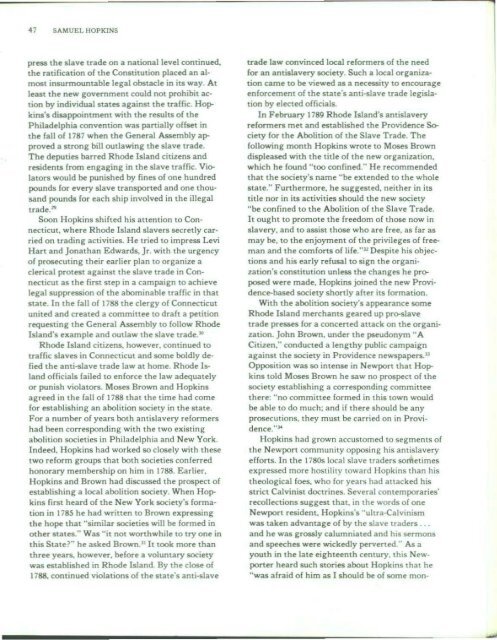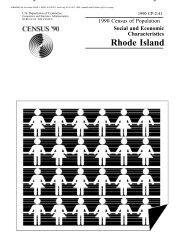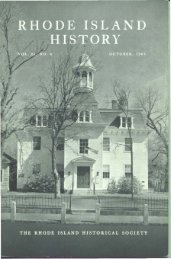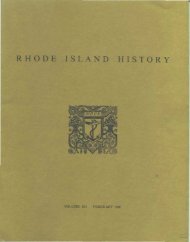RHODE ISLAND HISTORY - Rhode Island Historical Society
RHODE ISLAND HISTORY - Rhode Island Historical Society
RHODE ISLAND HISTORY - Rhode Island Historical Society
- No tags were found...
Create successful ePaper yourself
Turn your PDF publications into a flip-book with our unique Google optimized e-Paper software.
47 SAMUEL HOPKINSpress the slave trade on a nationa l level continued.the ratification of the Constitution placed an almostinsurmountable legal obstacle in its way. Atleast the new government could not prohibit actionby individual states against the traffic. Hopkins'sdisappointment with the results of thePhiladelphia convention was partially offset inthe fall of 1787 wh en the General Assembly approveda strong bill outlawing the slave trade.The de puties barred Rhod e Islan d citizens andresidents from engaging in the slave traffic. Violatorswould be punished by fines of one hundredpou nds for eve ry slave transported and one thousand pounds for each shi p involved in the illegaltrade."Soon Hopkins shifted his attenti on to Connecticut.wh er e Rh ode Isla nd slavers secretly carriedon trading activit ies. He tried to im press LeviHart and Jon ath an Edwards. Jr. with the urgencyof prosecuting their earlier plan to organize aclerical protest against the slave trade in Connecticutas the first step in a campaign to achievelegal suppression of the abominable traffic in thatstate. In the fall of 1788 the clergy of Connecticutunited and created a committee to draft a petitionreq uesting the General Assembly to follow <strong>Rhode</strong><strong>Island</strong>'s example and outlaw the slave trade.-<strong>Rhode</strong> <strong>Island</strong> citizens, however, continued totraffic slaves in Connecticut and some boldly defiedthe anti-slave trade law at home. <strong>Rhode</strong> <strong>Island</strong> officials failed to enforce the law adequatelyor pun ish violators. Moses Brown and Hopk insag reed in the fall of 1788 that the time ha d comefor establishing an abolition society in the state .Fo r a number of years bot h antislavery reform ershad bee n corresponding with the two ex istingabol ition societies in Philadelphia and New York.Indeed , Hopkins had worked so closely with thesetwo reform groups that both societies conferredhonorary mem bership on him in 1788. Earlier,Hopkins and Brown had discussed the prospect ofestablishing a local abolitio n society. Wh en Hopkinsfirst hea rd of the New York society's formationin 1785 he had written to Brown expressingthe hope that "sim ilar societies will be formed inot he r states: ' Was "it not worthwhile to try one inthis State?" he asked Brown.t' It took more thanthree years. however, before a voluntary societywas established in <strong>Rhode</strong> <strong>Island</strong>. By th e close of1788, continued violations of the state's anti-slavetrade law convinced local reformers of the needfor an antislavery society . Such a local organizationcame to be viewed as a necessity to encourageenforcement of the state's anti-slave trade legislationby elected officials.In February 1789 R hod e <strong>Island</strong>'s antislaveryre formers met and established the Providence S0ciety for the Abolition of the Slave T rade. T hefollo wing month Hopk ins wrote to Moses Browndispleased wit h the ti tle of the new organization.which he found "too confined." He recommendedthat the society's name "be extended to the wholestate." Furthermore. he suggested, neither in itstitl e nor in its activities sho uld the new society"be confi ne d to the Abolition of the Slave T rade.It oug ht to promote the freedom of those now inslavery, and to assist those who are free, as far asmay be, to the enjoyment of the privileges of freemanand the com forts of life." u Despite his objectionsand his ea rly refusal to sign the organization's constitut ion unless the changes he proposedwere made, Hopkins joined the ne w Providence-basedsociety shortly after its formation.With the abolitio n society's appearance some<strong>Rhode</strong> <strong>Island</strong> merchants geared up pro-slavetrade presses for a concerted attack on the organization.John Brown, under the pseudonym "ACitizen," conducted a lengthy public cam paignagainst the society in Providence newspapers.»Opposition was so int ense in Newport that Hopkinstold Moses Brown he saw no prospect o f thesoc iety establishing a corresponding committeethere: "no committee formed in this town wouldbe able to do much: and if the re should be anyprosecution s, they mu st be carried on in Providence......Hopkins had grown acc ustomed to segme nts ofthe Newport community opposing his antislaveryefforts. In the 1780s local slave traders sometimesexpressed more hostility toward Hopkins than histheological foes, who for years had att acked hisstric t Ca lvinist doctrines. Several contemporaries'recollections suggest that, in the w ords of oneNew po rt resident. Hopkins's "ultra-Calvinismwas taken ad vantage of by the slave traders ...and he was grossly calumniated and his sermonsand speeches were wickedly perverted." As ayouth in the late eig hteenth century. th is Newporterheard such stories about Hopkins th at he"was afraid of him as 1 should be of some men-











